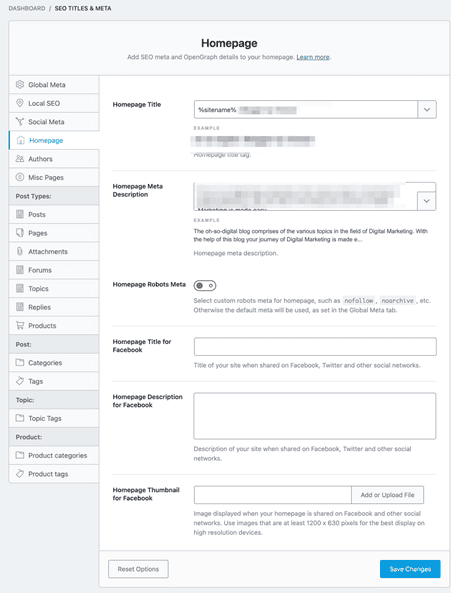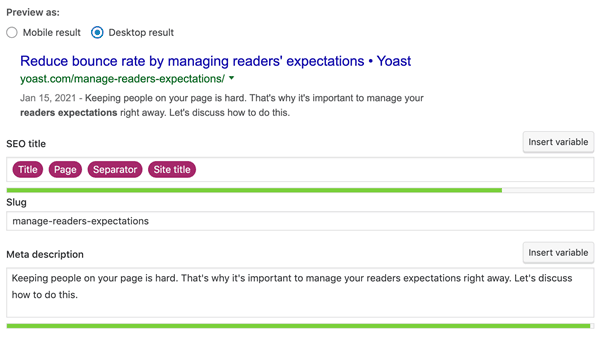Today in the life of a Digital Scientist, our Developer, Dom, explains page metadata: What it is, why it is important, and how it can help your website thrive on search engines. With extensive experience in building websites and applying search engine optimisation (SEO) techniques, we have mastered the handling of page metadata to ensure that our clients receive the opportunities they need to grow their businesses.
What Is Page Metadata?
Page metadata is the information that a search engine or browser uses to understand the content of a webpage. Setting contextually correct and strategically researched metadata allows search engines to better comprehend how your page should be indexed and for what terms. This can significantly impact its ranking depending on the quality and relevance of the metadata applied.
Why Is Page Metadata Important To Search Engines?
Search engines rely on metadata to effectively index webpages. Without it, your pages could be indexed for irrelevant phrases and queries, leading to missed opportunities for targeted traffic.
Technically, a webpage can be indexed without metadata, relying solely on on-page content, site structure, and internal linking. However, without metadata, search engines must infer the page’s context, which can lead to misclassification. A structured approach would involve:
- Allowing search engines to index the page naturally based on content and structure. Allowing search engines to index the page naturally based on content and structure.
- Analysing real-world user queries and search data. Analysing real-world user queries and search data.
- Refining metadata based on actual search behaviours to provide the most relevant indexing signals. Refining metadata based on actual search behaviours to provide the most relevant indexing signals.
A common issue we encounter is incorrect metadata leading to poor indexing. For instance, a cleaning service page may inadvertently rank for cleaning products instead of cleaning services due to improper metadata signals. Conducting thorough SEO research prior to designing and developing a page ensures alignment with user intent and business objectives.
Metadata, when implemented incorrectly, can harm a page’s rankings and damage its click-through rate (CTR), especially for already established and well-performing pages. Since metadata is now considered a signal rather than a directive, Google may override titles and descriptions with on-page content if it deems them more relevant to user queries. The goal should be to guide search engines rather than dictate, allowing for iterative refinements over time to enhance rankings and conversions.
Where Is Page Metadata Accessed Or Stored?
When building a website, metadata is typically stored within <head> HTML tags, which provide information about the page rather than visible content. Common forms of metadata include:
- Title Tag: Specifies the page title, which appears on search engine results pages (SERPs) and browser tabs.
- Meta Description: A summary of the page content that appears beneath the title in search results.
- Meta Keywords (allegedly deprecated by Google but we're still seeing positive influences on indexation): Historically used to impact rankings but now holds little to no SEO value aside from reinforcing topical indexing.
Most content management systems (CMS) allow for easy modification of metadata at the page level, including the homepage. Understanding where and how to adjust metadata ensures effective control over how search engines interpret and display your pages.


How Different Elements Of Metadata Influence Indexing, Ranking and Conversions
Metadata Titles and Their Impact
Metadata titles provide search engines and users with a concise understanding of a page’s content. They are primary indicators for indexation, specifying the phrases a page should be associated with. Titles work in conjunction with meta descriptions to influence click-through rates (CTR).
If a page ranks in position #2 on a SERP but has a more compelling title and description than the #1 result, it can receive a higher CTR. Over time, improved engagement can elevate the page to the top position. This highlights the importance of SEO research to understand user search behaviour and tailor metadata accordingly to the users you wish to target.
A strong CTR signals to search engines that a page is more relevant, leading to better rankings. Additionally, reducing bounce rates (when users leave quickly after landing on a page) reinforces the page’s value.
Meta Descriptions and Their Role
Meta descriptions primarily impact CTR rather than indexing or rankings. While they do not directly influence rankings, they provide essential context that entices users to click. The key to writing effective descriptions includes:
- Keeping them between 150-160 characters to avoid truncation.
- Using natural language that aligns with user queries.
- Highlighting key benefits and relevance to the search intent.
Meta Keywords and Their Function
Other Forms of Metadata
- Open Graph Tags: Define how content appears when shared on social media platforms like Facebook and LinkedIn, including custom titles, descriptions, and images.
- Rich Snippets: Provide additional search result enhancements such as review ratings, images, and product details, improving engagement and visibility.
Why Page Metadata Matters for Businesses
Effective metadata enhances website visibility, making it easier for search engines to index and rank pages for relevant queries. This leads to increased traffic and business growth opportunities. Well-optimised metadata ensures:
- Higher visibility for targeted keywords.
- Better representation in search results.
- Increased CTR and improved rankings.
Titles and descriptions should be crafted based on extensive research, ensuring alignment with business objectives and user intent.
Metadata Guidelines For Best Practices
Title Guidelines
- Keep between 50-60 characters to prevent truncation.
- Place primary keywords at the beginning for better visibility.
- Avoid keyword stuffing, as Google may ignore over-optimised titles.
- Make titles compelling to encourage clicks.
On testing, larger titles continue to perform but try to write them as a phrase, such as some form of Local SEO, if doing this as if they are truncated or selected based on user query they can still work well contextually to aid CTR i.e. QuickFireSEO Agency In Portsmouth | SEO Agencies Near Me | SEO agencies in Hampshire - would result in potential variations being shown subject to user queries so don't restrict yourself but do continue to test as always the most effective SEO is performed by those continually testing the algorithm updates!
Description Guidelines
- Keep between 150-160 characters.
- Include relevant keywords naturally.
- Summarise the page’s content clearly and concisely.
- Avoid generic phrases that do not provide value to users.
We wouldn't go above the description count and risk truncated descriptions, so keep this compelling and on point.
Keyword Guidelines
- Focus on 10-15 targeted phrases.
- Ensure keywords are directly related to the content.
- Avoid over-stuffing to prevent indexing for irrelevant queries.
Keep them relevant put contextually broad, use synonyms, phrase variations and so on to aid indexation from the meta keywords and support rankings for their use elsewhere in meta, or on page content or linking, again inline with actual user data typically with the right intent subject to the page goal.
Robot Directives and Their Impact
If a website has multiple pages with similar content, it can harm SEO rankings due to duplicate indexing. The meta robots tag allows directives to control:
- Whether a page is indexed.
- How search engines crawl and follow links.
- Whether specific URL parameters should be excluded.
Applying no-index to non-essential pages (e.g. login pages, internal search results) helps conserve crawl budget, ensuring search engines focus on important content.
Best Practices
- Avoid blocking important pages.
- Ensure directives align with the website’s sitemap.
- Regularly audit directives to maintain consistency.
No indexing is a hugely effective tool - but stay away if you're not performing significant research and educating yourself first. Noindexing the wrong URL parameters for example can prevent particular Google bots relating to ads being able to access images and other information important for feeds that a responsible for product listings, advertisements and so on.
The Digital Scientist Approach to Metadata
Metadata optimisation is complex, requiring extensive research, technical expertise, and strategic refinement. At Pixel Perfect and QuickFireSEO, we have honed our expertise over years of real-world testing and experience, using the best industry practices (where proven) as one small area in our arsenal to help accelerate our customers growth online.








